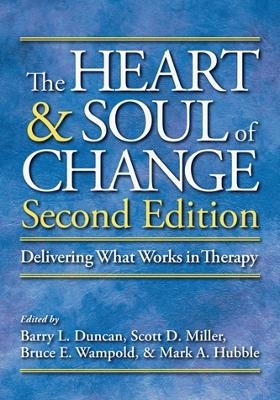
The Heart and Soul of Change
American Psychological Association (Verlag)
978-1-4338-4210-8 (ISBN)
The Heart and Soul of Change, now in paperback, examines the common factors underlying effective psychotherapy and brings the psychotherapist and the client-therapist relationship back into focus as key determinants of psychotherapy outcome. This edition also demonstrates the power of systematic client feedback to improve effectiveness and efficiency and legitimize psychotherapy services to third party payers.
Barry L. Duncan, PsyD, is a therapist, trainer, and researcher with more than 17,000 hours of clinical experience. He is director of the Heart and Soul of Change Project, a practice-driven training and research initiative that focuses on what works in therapy and, more importantly, how to deliver it on the front lines via client-based outcome feedback. Dr. Duncan received the Wright State University School of Professional Psychology's first annual Outstanding Alumnus Award for his contributions to the field, and the Psychotherapy Networker 20th Anniversary All Time Top Ten Award for the article "Exposing the Mythmakers." He has more than 100 publications, including 15 books, including Brief Intervention for School Problems; What's Right With You; The Heroic Client; and the volume, On Becoming A Better Therapist. Scott D. Miller, PhD, is a cofounder of the Center for Clinical Excellence, an international consortium of clinicians, researchers, and educators dedicated to promoting excellence in behavior health. Dr. Miller conducts workshops and training in the United States and abroad, helping hundreds of agencies and organizations, both public and private, to achieve superior results. He is the author of numerous articles and a coauthor of many books including Escape From Babel: Toward a Unifying Language for Psychotherapy Practice; Psychotherapy With Impossible Cases: Efficient Treatment of Therapy Veterans ; The Heart and Soul of Change: What Works in Therapy; The Heroic Client: A Revolutionary Way to Improve Effectiveness Through Client-Directed, Outcome-Informed Therapy; and Achieving Clinical Excellence: Lessons From the Field's Most Effective Practitioners. Bruce E. Wampold, PhD, ABPP, who was trained in mathematics (BA from the University of Washington) before earning his doctorate in counseling psychology (PhD from the University of California, Santa Barbara) is professor and chair of the Department of Counseling Psychology at the University of Wisconsin–Madison. Currently, his work involves understanding counseling and psychotherapy from empirical, historical, methodological, and anthropological perspectives. He is the author of more than 100 books, chapters, and articles related to counseling, psychotherapy, statistics, and research methods and has given lectures on these subjects nationally and internationally. Mark A. Hubble, PhD, a national consultant, has coauthored and coedited several books, including The Handbook of Solution-Focused Brief Therapy, Escape From Babel: Toward a Unifying Language for Psychotherapy Practice, and Staying on Top and Keeping the Sand Out of Your Pants: A Surfer's Guide to the Good Life, and was the lead editor for the award-winning first edition of The Heart and Soul of Change: What Works in Therapy. Dr. Hubble is a graduate of the postdoctoral fellowship in clinical psychology at Menninger and formerly served on the editorial review board for the Journal of Systemic Therapies.
Contributors
Foreword
David E. Orlinsky
Preface
Prologue: Saul Rosenzweig: The Founder of Common Factors
Chapter 1. Introduction
Mark A. Hubble, Barry L. Duncan, Scott D. Miller, and Bruce E. Wampold
Part I. What Works and What Does Not: The Empirical Foundations for the Common Factors
Chapter 2.The Research Evidence for Common Factors Models: A Historically Situated Perspective
Bruce E. Wampold
Chapter 3. Clients: The Neglected Common Factor in Psychotherapy
Arthur C. Bohart and Karen Tallman
Chapter 4. The Therapeutic Relationship
John C. Norcross
Chapter 5. Putting Models and Techniques in Context
Timothy Anderson, Kirk M. Lunnen, and Benjamin M. Ogles
Chapter 6. Evidence-Based Practice: Evidence or Orthodoxy?
Julia H. Littell
Chapter 7. Psychiatric Drugs and Common Factors: An Evaluation of Risks and Benefits for Clinical Practice
Jacqueline A. Sparks, Barry L. Duncan, David Cohen, and David O. Antonuccio
Part II. Delivering What Works: Practice-Based Evidence
Chapter 8. "Yes, It Is Time for Clinicians to Routinely Monitor Treatment Outcome"
Michael J. Lambert
Chapter 9. Outcomes Management, Reimbursement, and the Future of Psychotherapy
G. S. (Jeb) Brown and Takuya Minami
Chapter 10. Transforming Public Behavioral Health Care: A Case Example of Consumer-Directed Services, Recovery, and the Common Factors
Robert T. Bohanske and Michael Franczak
Part III. Special Populations
Chapter 11. Evidence-Based Treatments and Common Factors in Youth Psychotherapy
Susan Douglas Kelley, Leonard Bickman, and Earta Norwood
Chapter 12. Common Factors in Couple and Family Therapy: Must All Have Prizes?
Jacqueline A. Sparks and Barry L. Duncan
Chapter 13. What Works in Substance Abuse and Dependence Treatment David Mee-Lee, A. Thomas McLellan, and Scott D. Miller
Part IV. Conclusions
Chapter 14. Delivering What Works
Scott D. Miller, Mark A. Hubble, Barry L. Duncan, and Bruce E. Wampold
Index
About the Editors
| Erscheinungsdatum | 01.12.2022 |
|---|---|
| Verlagsort | Washington DC |
| Sprache | englisch |
| Maße | 178 x 254 mm |
| Themenwelt | Geisteswissenschaften ► Psychologie ► Klinische Psychologie |
| Geisteswissenschaften ► Psychologie ► Verhaltenstherapie | |
| Medizin / Pharmazie ► Medizinische Fachgebiete ► Psychiatrie / Psychotherapie | |
| ISBN-10 | 1-4338-4210-6 / 1433842106 |
| ISBN-13 | 978-1-4338-4210-8 / 9781433842108 |
| Zustand | Neuware |
| Informationen gemäß Produktsicherheitsverordnung (GPSR) | |
| Haben Sie eine Frage zum Produkt? |
aus dem Bereich


